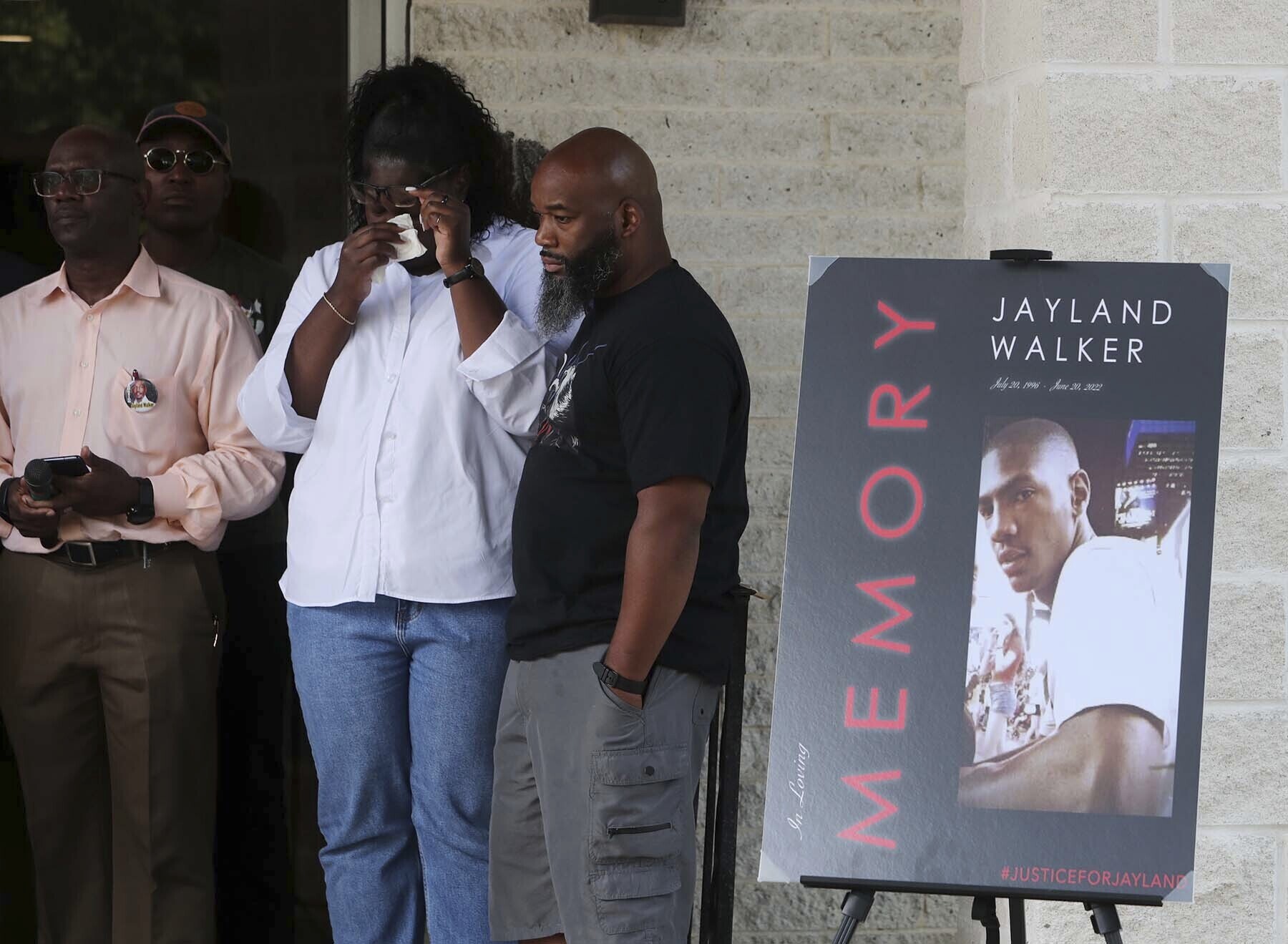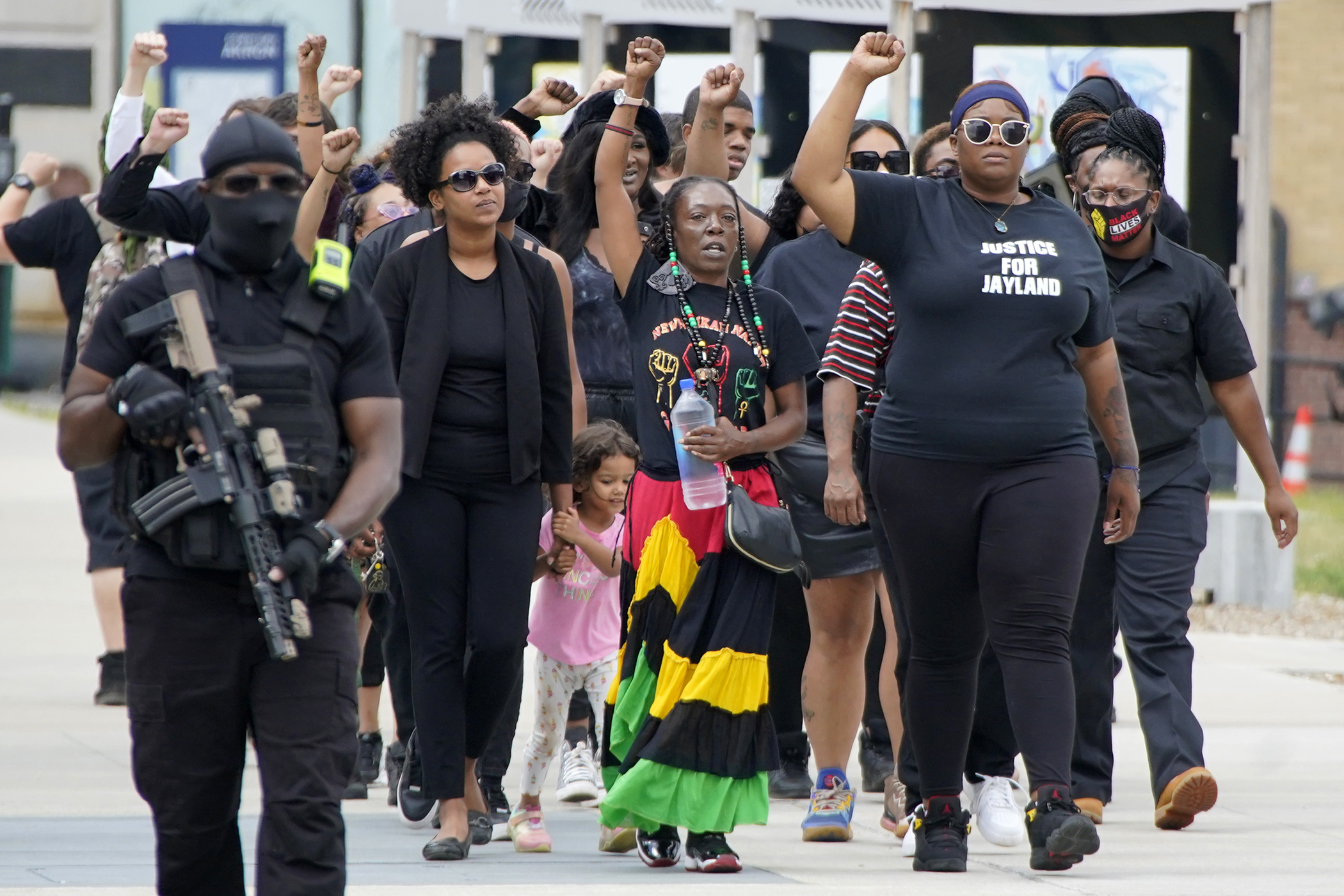
The police killing of Jayland Walker on June 27 in Akron, Ohio led to large-scale protests in the city—and in Washington, D.C. The 25-year-old Black man had more than 60 gunshot wounds, and was unarmed when he died. Body-cam video from some of the officers who were on the scene when Walker was killed has raised more questions than answers for many. But activists say pledges by city and state officials to investigate the shooting are not enough.
Walker was honored on Wednesday at a funeral service, which was local TV stations and attended by hundreds of people in the city of 189,000 people. Walker’s family and friends shared heartfelt remembrances, recalling how he was never shy about expressing his love. “There were a lot of ‘I love you’s’ back and forth,” said his cousin, Robin Elerick. They spoke of his passion for wrestling, underground music, and basketball. “It just sucks because I used to call Jayland almost all the time and I can’t call him anymore when I’m going through some things. So this is pretty hard for me, standing up here,” Dupri Whatley, his best friend, said through tears. “But he’s going to live through me. I’m never going to forget him.”
At the memorial service, Bishop Timothy Clarke, of the First Church of God in Columbus said the community was right to be outraged over Walker’s death. “This is not alright. There is nothing right about this. We should not be here and Jayland should not be in that box,” Timothy said.
The events that led to Walker’s killing began when an officer tried to pull him over for a vehicle violation and a traffic violation and he fled. The situation escalated after the officer reported that a shot was fired from Walker’s car. Walker then got out and ran, pursued by multiple officers. Eight officers began shooting, firing more than 90 times, according to his family’s attorney. Officers handcuffed Walker, who was unarmed, even after shooting him. Police said they later found a handgun on the front seat of Walker’s car. The local police union has said it believes that use of force was justified.
Akron police are conducting an internal investigation and Ohio’s Bureau of Criminal Investigation is leading a probe into Walker’s death and any potential misconduct by law enforcement.
The Rev. Ray Greene Jr., executive director of the Freedom BLOC in Akron, says Walker’s death sparked such a response in part because of Akron police’s repeated targeting of the Black community. “Why are we training officers to ‘eliminate the threat’ of a citizen of the city that they live in? This isn’t a war; you don’t eliminate the threat,” Greene says. While there have been some reforms over the past two decades, to Greene they represent “incremental ways to keep people satisfied, keep people shut up.”

Since 2000, there have been more than 35 deaths in Akron that occurred when police were present or that were caused by police, according to a database compiled by journalist D. Brian Burghart in collaboration with researchers at the University of Southern California. This figure includes police shootings.
The local NAACP chapter, as well as a group of local lawmakers—the Black Elected Officials of Summit County—have called for the Department of Justice to launch a federal investigation. “What I’d like to see happen is that, first of all, any equipment violations should never lead to the death of anyone. That’s number one,” said Judi Hill, president of NAACP Akron, according to the Akron Beacon Journal. “You go to Cleveland, you go anywhere, they take a picture of your license plates, and they send you a frickin’ ticket. Send me the ticket.” President Joe Biden said July 6 that the Justice Department is closely monitoring the case, but so far the DOJ has not acted.
Greene, for his part, is urging Congress to pass the George Floyd Justice in Policing Act, which would provide greater accountability and tracking of police shootings and use of force. The legislation would have created a national registry of police misconduct cases, added required training for racial profiling and implicit bias—and made it easier to federally convict law enforcement officer for misconduct. It passed the U.S. House last year, but failed to get bipartisan support in the Senate. “We don’t want incremental change,” he says. “We need revolutionary change today.”
More Must-Reads from TIME
- Donald Trump Is TIME's 2024 Person of the Year
- Why We Chose Trump as Person of the Year
- Is Intermittent Fasting Good or Bad for You?
- The 100 Must-Read Books of 2024
- The 20 Best Christmas TV Episodes
- Column: If Optimism Feels Ridiculous Now, Try Hope
- The Future of Climate Action Is Trade Policy
- Merle Bombardieri Is Helping People Make the Baby Decision
Write to Sanya Mansoor at sanya.mansoor@time.com